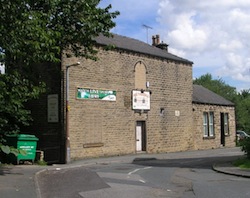PAUL SALVESON laments the decline of labour rooms and socialist clubs. But while many are closing, he says, at least one is struggling to be re-born in a new co-operative guise.
The early socialist movement understood the importance of having your own place. Whether it was the radical clubs of London or the socialist rooms in the industrial north, they were a key part of building a new politics. It’s one of the great tragedies of the modern Labour movement that so few survive.
Many ‘labour clubs’ long since became nothing more than cheap drinking dens and most have succumbed to competition from even cheaper booze from supermarkets. But all is not lost.
One of the oldest surviving socialist clubs in Britain, at Milnsbridge in the Colne Valley near Huddersfield, is at the heart of a revival of radical politics in an area where socialist politics struck deep roots, leading to the election of socialist firebrand Victor Grayson in 1907.
Milnsbridge Socialist Club was once surrounded by a thriving textile industry; the community had dozens of mills employing thousands of workers, many of whom flocked to the new socialist organisations that sprang up around here in the 1890s.
The club opened in 1892 and hosted speakers including Christabel Pankhurst, Kathryn Bruce Glasier, Victor Grayson and Philip Snowden. It even had its own socialist brass band which used to perform at trade union and socialist demonstrations and on the annual May Day procession. A photograph of the band still adorns the club’s concert room.
Milnsbridge was one of many socialist clubs in the Colne Valley. Their programme of social events, regular speakers and discussions provided a base for Clarion cyclists and choirs and were an essential part of the infrastructure of a hugely successful socialist movement. Britain’s first socialist county councillor, George Garside, was elected in Colne Valley and Grayson’s 1907 victory sent shock waves through the establishment.
But heritage on its own is no guarantee of salvation. Milnsbridge Socialist Club faced all the same problems that social clubs have had to deal with in the last few years: changing habits, an inability to appeal to a broader market, rising debts. It closed its doors in June and the future looked bleak.
However, a group of local socialists, greens and anarchists have got together to save the club and create a new and more inclusive venue for a wider area which will also attract local community involvement.
Co-operative solution?
The club has been re-christened ‘The Red and Green Club’ and a co-operative has been formed to buy the building from its current owners, which it is renting to the end of the year. That gives the new co-operative a breathing space to raise £100,000 needed for the purchase. That’s no easy task and the co-op will be launching a fund-raising campaign shortly. It is talking to several national trades unions about getting help from them to cover the capital costs of purchase and has benefited from free advice from the national co-operative movement.
One of the club’s ideas is to visit other places where people are doing similar things and have faced the same challenges in funding and finding a new direction. Not far away is Bradford’s 1 in 12 club (no, not a gradient)which has similarly inclusive radical politics.
And just up the line is Hebden Bridge’s highly successful Trades Club, one of the north’s most acclaimed music venues. Both are overtly political, without being tied to one party organisation. And across the Pennines is Bolton Socialist Club, founded in 1887 and still going strong as a good example of united left activity.
Another venerable survivor is Nelson ILP’s marvellous Clarion House set in magnificent countryside on the slopes of Pendle Hill. It was built by ILPers in 1912 and was recently featured on BBC Radio 4. It opens every Sunday and is a haven for cyclists and walkers. Keir Hardie’s portrait dominates the room, together with a ‘Clarion’ banner.
I’d love to hear about other examples of socialist-inclined clubs around the country. Maybe there are more than I think but there doesn’t seem to be any sort of network. The old National Union of Labour and Socialist Clubs is more for traditional labour clubs and doesn’t even have a website as far as I can see.
—-
Professor Paul Salveson is general secretary of the Hannah Mitchell Foundation and author of Socialism with a Northern Accent.
This is an abridged version of an article which appears in the current issue of Chartist magazine.
Paul Salveson also featured in ‘Party Politics is Slowly Dying’ in The Observer, 8 September 2013.


